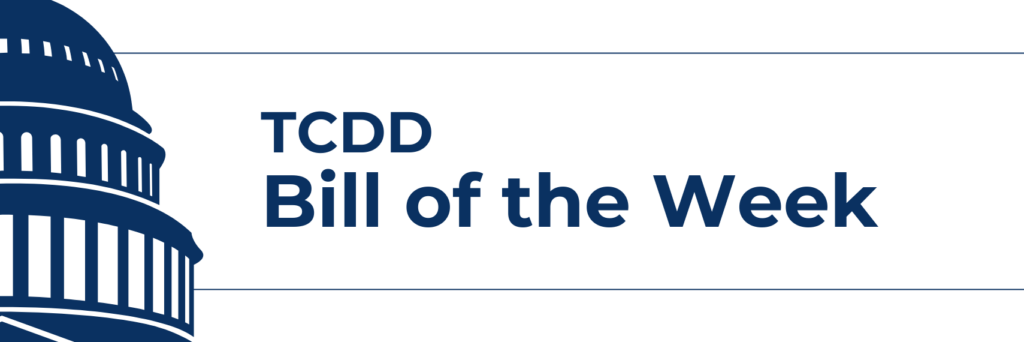
Table of Contents
For this weekly feature, the Texas Council for Developmental Disabilities (TCDD) profiles a noteworthy bill going through the legislative process. The bill may relate directly to TCDD’s Public Policy Priorities or another disability-related issue.
Bill of the Week: HB 175
House Bill (HB) 175, relating to establishing optional certifications and a grant program for child care providers participating in the Texas Rising Star Program. HB 175 was authored by Rep. Mary González from El Paso, District 75.
Share This Bill
We’ve created a Bill of the Week one-pager (PDF) for HB 175. This is a simplified explanation of the bill that you can share with your representative and personal network.
Background
Access to high-quality child care plays a crucial role in shaping early learning and social development. However, the families of children with disabilities often face additional barriers in seeking appropriate child care opportunities.
Federal laws, such as the Americans with Disabilities Act and Section 504 of the Rehabilitation Act, establish clear requirements for child care providers regarding the inclusion and care of children with disabilities. Additionally, recent rule changes in Texas have advanced inclusive child care practices. The Texas child care licensing minimum standards include provisions for serving children with “specialized care needs,” “special health care needs,” and “disabilities.” These standards require providers to follow a child’s medical guidance from their doctor, retain documentation about the child’s needs, and implement programming that aligns with the child’s developmental level. This may include utilizing adaptive equipment and reasonable accommodations.
Many accommodations required under federal and state guidelines can be implemented at little or no cost. Others, such as environmental renovations or sustained additional staff support, can be more expensive. Many child care providers are unaware of these guidelines, have misconceptions regarding the costs, or request additional support to implement necessary accommodations.
The Texas Health and Human Services Commission establishes and enforces minimum child care licensing standards. The Texas Workforce Commission (TWC) also plays a role in child care, overseeing programs to improve and expand child care services across the state. Among these programs is inclusion rate assistance, which provides a reimbursement rate for providers to make reasonable accommodations to serve a child with disabilities, or to assist families if a child’s disability requires more fundamental modifications. Parents must begin the inclusion rate assistance process; providers cannot start the process.
TWC also administers Texas Rising Star, a quality rating and improvement system for certain child care providers. The Texas Rising Star program currently offers three levels of quality certification (two-star, three-star, and four-star) to encourage child care and early learning programs to attain progressively higher levels of quality. These certification levels are tied to graduated-enhanced reimbursement rates for children receiving child care scholarships.
What does the bill do?
HB 175 would amend the Government Code to require TWC to create optional certifications that a child care provider may obtain to enhance their Texas Rising Star rating. It specifies that the new optional certifications must include a certification for providers that support the inclusion of children with disabilities alongside their non-disabled peers.
Additionally, the bill would require TWC to establish and administer a grant program for child care providers who obtain one of the optional certifications. Providers would receive additional funding each year they receive or maintain an optional certification.
To receive a grant, a provider would be required to submit an application to TWC in a manner specified by the commission. When determining the amount of a grant, TWC would be required to consider the age groups of children served by the provider and the provider’s enrollment capacity.
The bill allows TWC to accept gifts, grants, and donations from any public or private source to support the program.
If passed, HB 175 would take effect on Sept. 1, 2025. TWC would be required to adopt rules to implement the new provisions as soon as possible.

“[HB 175] will provide an optional certification for Texas Rising Star. … It is a way to incentivize and support the institutions that want to help kids with disabilities.”
Rep. Mary González, HB 175 author
Where is the bill in the process?
On May 8, 2025, HB 175 was passed by the Texas House. It is currently waiting for referral to committee in the Senate.
The bill received a public hearing before the House Trade, Workforce, and Economic Development Committee on April 9. You can watch the discussion on it here, beginning at the 0:41:11 mark.
Who supports the bill and why?
The following comments were provided at the April 9 hearing on HB 175:
- Texans Care for Children: David Feigen, director of early learning policy for Texans Care for Children, testified in support of HB 175. He indicated that high-quality child care is vital for all children’s learning environments, but it is especially important for children with disabilities. He stated: “Research has shown us that children with disabilities who participate in a well-facilitated, well-organized child care program do show higher self-esteem, improved communication skills, greater academic achievement later in life.” He explained that, unfortunately, many parents struggle to find a child care facility that meets the needs of their child with a disability, often “having to enroll and disenroll from program after program because it’s not meeting their child’s needs and having to get on long wait lists for years to try get into that one program.” Feigen closed by stating: “HB 175 is creative in that it is both helpful for parents to find these programs that are providing exemplary services for their child, but also will expand the number of those programs actually available.”
- Child Care Provider: Tamkeen Shroff, owner of Goddard School Long Meadow Farm, testified in favor of the bill. She indicated that her child care center and preschool is a Texas Rising Star four-star school that works with children with disabilities. She suggested that the current TWC inclusion rate assistance incentive is not very helpful because parents must perform additional administrative work and seek additional funding for the child care center where their child is enrolled. Shroff stated that the bill “would be very helpful in that it recognizes those individuals who are capable, who have training working with students with special needs, and lets parents decide where they want their children to go.”
The following groups also registered their support for the bill: The Arc of Texas, Child Care Associates, Children at Risk, Every Texan, Institute to Advance Child Care at CCA, Kiddie Academy of Bryan and Kiddie Academy of College Station, Texas Association of Goodwills, Texas Council of Administrators of Special Education, Texas Council of Community Centers, Texas Economic Development Council, Texas Licensed Childcare Association, and United Ways of Texas.
Who opposes the bill and why?
There was no registered opposition to the bill.
Additional Testimony
The following comments were offered on the bill at the April 9 hearing:
- TCDD: Lauren Gerken, a senior public policy analyst for TCDD, testified on the bill. She detailed the Council’s involvement with an inclusive child care workgroup, looking at the issues and barriers faced by parents of children with disabilities. She explained that “their children are denied if they require accommodations because child care providers do not understand the options and costs associated with difficult accommodations in child care settings and they don’t know where to go for support.” She continued by stating: “having a grant program in place where people can engage and get that financial support means that a provider can adjust the accommodations without that concern attached to any burdens that might be placed on the program financially.”
Additional Information
TCDD has identified early childhood and inclusive education as one of its public policy priorities for the 89th Texas Legislature:
Ensure children with disabilities ages 0-22 receive necessary services to promote healthy growth and development to support long-term success and independence. Children with disabilities in Texas deserve access to quality care and education such as inclusive childcare, therapy and case management services, special education services, and transition planning, which meet or exceed federal standards to increase childhood and long-term outcomes.
How much will the bill cost?
The Legislative Budget Board (PDF) found that HB 175 would not impact the state budget in a significant way. However, the board estimates that the bill may impact the amount of child care services and operations funded in Texas by the federal child care and development fund.
Is there a Senate companion to the bill?
There is no Senate companion to HB 175.
Stay Informed
For the latest information about where HB 175 is in the process, follow the bill on the Texas Legislature Online. To receive future legislative updates from TCDD, follow us on Facebook, X, Instagram, and LinkedIn.
Bill of the Week Updates
Here is an update on a previous TCDD Bill of the Week for the 89th legislative session.
HB 1041 passed the Senate on May 16 and now heads to the governor for signature into law. The bill would prohibit paid caregivers from serving as beneficiaries of life insurance policies for individuals under their care.
HB 1936, which would strengthen the enforcement of accessible parking violations, was passed by the Texas House on May 10. It has been referred to the Senate Transportation Committee, where it awaits scheduling for a public hearing.
HB 2081 passed the Senate on May 13 and has been sent to the governor for signature into law. It would establish the Building Better Futures Program for students with IDD.
Senate Bill 1447 has been scheduled for a May 20 hearing by the House Public Education Committee. The bill would direct the Texas Education Agency to adopt standards relating to the use of assistive technology as needed for individualized special education programs and 504 plans.
